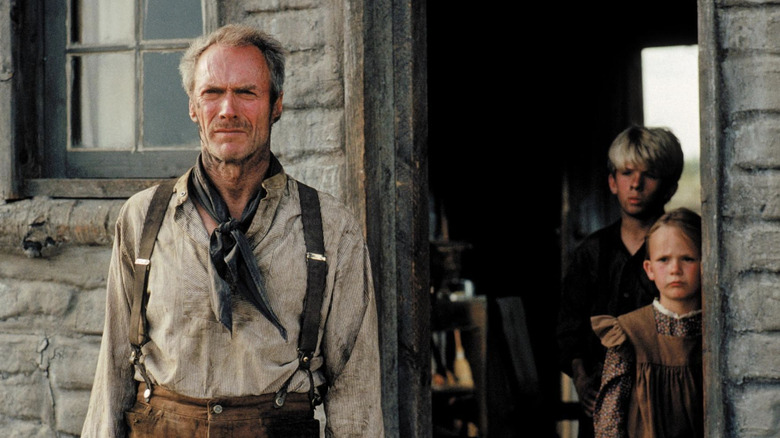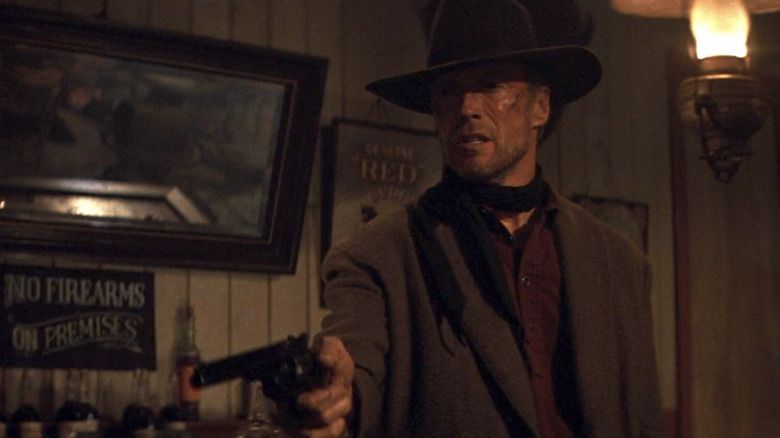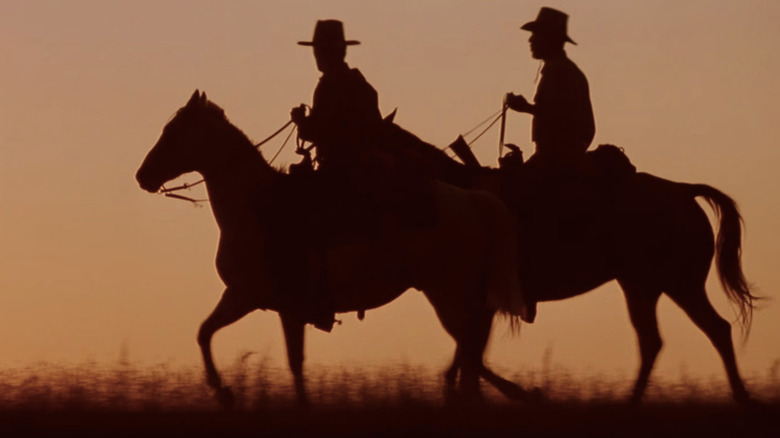Clint Eastwood's Most Famous Unforgiven Line Needed A Small-But-Crucial Rewrite
Clint Eastwood's 1992 Western "Unforgiven" is a landmark film not just in the filmography of Clint Eastwood but in the Western genre as a whole. Just when it felt like the genre didn't have anything new to offer, "Unforgiven" felt like a breath of fresh air, executed as a dark subversion of the classic Western — reexamining the tropes and archetypes of many classic films of the genre. "Unforgiven" deconstructs the Western myth while also telling an engaging and intense story. However, as provocative and slow-burn that "Unforgiven" is, there are still moments in the film that feel like a celebration of the very genre it's looking to demystify.
Case in point, one of the more famous lines from "Unforgiven" feels ripped straight out of a Western from Eastwood's earlier days. However, the line wasn't always reminiscent of the older Westerns. Had it not been for a small but critical rewrite, the now-famous line would have felt entirely different in the context of the situation. The behind-the-scenes story of this rewrite speaks to the film's themes and is a testament to what the result of a healthy collaboration between creators looks like.
'Deserve's got nothing to do with it'
In an interview with Yahoo! Entertainment in honor of the film's 30th anniversary, "Unforgiven" screenwriter David Peoples talked about a line from his original script that Eastwood changed from the film. After the climactic shootout at the end of the movie, Little Bill contemplates his death at the hands of Will Munny in a powerhouse performance from Gene Hackman. The character is bitter to the end, believing that he didn't deserve to go out the way he did, bleeding out on the floor of a saloon. Munny's response? "Deserve's got nothing to do with it."
According to Peoples, he initially thought his original line in the script, "Deserve don't mean s***," better suited the film. However, upon actually seeing how people resonated with the line, he understood Eastwood's capability as a storyteller, and his initial adverse reaction as a writer comes with the territory of collaborating with another filmmaker:
"He changed it because he said it sounded too modern, and I respect that. I originally thought 'Deserve's got nothing to do with it' sounded a little awkward, whereas 'Don't mean s***' had a better rhythm. So I felt a little bad about it for a while until I heard people quoting it! When that happened, I realized, 'Clint knew what he was doing.' [Laughs] That's normal for writers: we can react very negatively to any line that changes, sometimes because it's changed for the worse and other times because it's just different than what we heard in our heads."
The beauty in collaboration
Eastwood's criticism of the original line being too modern feels contradictory to the themes of "Unforgiven." As much as the film is a subversion and criticism of the more mythical aspects of earlier Westerns, Eastwood seems to have parts of the genre he wasn't ready to part ways with. In a way, the director seems to have gotten the best of both worlds in changing the line. While "Deserve don't mean s***" would've further solidified the film's tone and nihilistic message, Eastwood opted for a closing line that both spoke to the overarching message while being reminiscent of the old Western myths and heroes of the past.
Eastwood didn't rewrite things just for the sake of it, either. In the same interview, Peoples expressed his respect for the director, recognizing when a scene is better left as it is, even after a rewrite:
"I learned almost everything about the movie when I saw the movie. He once asked me to do two pages of rewrites, but when he invited me over to see a film cut, I said, 'The rewrite isn't in there.' And he said, 'Nah, it was better before.' That's one of the things that makes me admire him tremendously: in Hollywood, people tend to write things until they get really bad, and then they either make them or put them in a drawer. But he doesn't rewrite things to death. My rewrite wasn't an improvement, so he threw it away, and that's pretty unusual, which gets my respect."
Collaboration on an artistic endeavor can be difficult. A delicate balance of confidence and humility is needed when trying to make a movie as bold and compelling as "Unforgiven." Luckily, David Peoples had an experienced and no-nonsense director like Eastwood that helped to make "Unforgiven" something truly exceptional.


